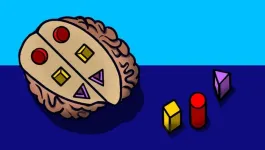(Press-News.org) (San Diego, Calif.--September 7, 2024, 8:30 a.m. PDT)--The antibody–drug conjugate
ifinatamab deruxtecan (I-DXd) showed clinically meaningful responses in pretreated patients with extensive-stage small cell lung cancer (ES-SCLC), according to an interim analysis of the Phase 2 IDeate-Lung01 study. The data was presented today at the International Association for the Study of Lung Cancer (IASLC) 2024 World Conference on Lung Cancer.
Patients with ES-SCLC face poor outcomes and have limited treatment options. B7 homolog 3 (B7-H3 [CD276]) is part of the B7 family, which includes immune checkpoint proteins such as PD-L1. B7-H3 is highly expressed in many solid tumors but is absent or expressed at low levels in normal tissues. High and consistent expression of B7-H3 has been shown across all molecular subtypes of SCLC and has been linked to poor prognosis. I-DXd, a B7-H3–directed antibody–drug conjugate, demonstrated promising efficacy in the ongoing Phase 1/2 IDeate-Pantumor01 study, with a confirmed objective response rate (ORR) of 52.4% and a median duration of response (DOR) of 5.9 months in the SCLC cohort (n=22).
In the dose optimization part of the ongoing Phase 2 IDeate-Lung01 study (NCT05280470), two doses of I-DXd (8 mg/kg and 12 mg/kg IV every 3 weeks) were evaluated in patients with ES-SCLC who had received at least one prior line of platinum-based chemotherapy and no more than three prior lines of systemic treatment. Patients with asymptomatic brain metastases could participate in the study. The primary endpoint was ORR by blinded independent central review, with secondary endpoints including DOR, progression-free survival, overall survival, disease control rate, time to response (TTR), and overall safety profile.
As of April 25 2024, 88 patients had received at least one dose of I-DXd; 46 patients received I-DXd 8 mg/kg and 42 patients I-DXd 12 mg/kg, with a median follow-up of 14.6 and 15.3 months, respectively. I-DXd demonstrated promising efficacy, with a confirmed ORR of 54.8% in the 12-mg/kg cohort and of 26.1% in the 8-mg/kg cohort. A rapid response (TTR: 1.4 months) was observed at both doses, while median DOR was 7.9 months in the 8-mg/kg cohort and 4.2 months in the 12-mg/kg cohort. In a subgroup analysis of 16 patients with brain target lesions at baseline, the intracranial response was 66.7% among 6 patients who received I-DXd 8 mg/kg, and 50.0% among 10 patients treated with I DXd 12 mg/kg. During the study, a higher frequency of treatment-emergent adverse events was reported in the 12-mg/kg cohort than in the 8 mg/kg cohort; the most common TEAEs were gastrointestinal or hematologic in nature, or fatigue. The incidence of adjudicated interstitial lung disease was similar between cohorts, consistent with previous reports.
“I-DXd at both doses showed clinically meaningful efficacy in heavily pretreated patients with ES-SCLC, with the 12-mg/kg dose demonstrating approximately twice the confirmed ORR of the 8-mg/kg dose,” according to Dr. C.M. Rudin of Memorial Sloan Kettering Cancer Center in New York City. Dr. Rudin added that the safety profile was generally consistent across the two doses and while no new safety signals were observed, TEAEs were more frequent at the higher dose. Based on these findings, the 12-mg/kg dose has been selected as the optimal dose for monotherapy in SCLC and will be further studied in the extension part of IDeate-Lung01 and in the Phase 3 IDeate-Lung02 study.
About the IASLC:
The International Association for the Study of Lung Cancer (IASLC) is the only global organization dedicated solely to the study of lung cancer and other thoracic malignancies. Founded in 1974, the association's membership includes more than 10,000 lung cancer specialists across all disciplines in over 100 countries, forming a global network working together to conquer lung and thoracic cancers worldwide. The association also publishes the Journal of Thoracic Oncology, the primary educational and informational publication for topics relevant to the prevention, detection, diagnosis, and treatment of all thoracic malignancies. Visit www.iaslc.org for more information.
About the WCLC:
The World Conference on Lung Cancer (WCLC) is the world’s largest meeting dedicated to lung cancer and other thoracic malignancies, attracting nearly 7,000 researchers, physicians and specialists from more than 100 countries. The goal is to increase awareness, collaboration and understanding of lung cancer, and to help participants implement the latest developments across the globe. The conference will cover a wide range of disciplines and unveil several research studies and clinical trial results. For more information, visit https://wclc2024.iaslc.org.
END
Antibody–drug conjugate I-DXd shows clinically meaningful response in patients with extensive-stage small cell lung cancer
2024-09-07
ELSE PRESS RELEASES FROM THIS DATE:
IASLC Global Survey on biomarker testing reveals progress and persistent barriers in lung cancer biomarker testing
2024-09-07
[San Diego, Calif --September 7, 2024, 8:30 a.m. PCT)– Despite significant improvements in the perception of biomarker testing compared to a 2018 survey, substantial barriers to implementation persist globally, according to results of the 2024 IASLC Global Survey on Biomarker Testing released today at the International Association for the Study of Lung Cancer (IASLC) World Conference on Lung Cancer 2024.
The 2018 survey revealed the adoption of biomarker testing was low due to cost, lack of quality and standards, ...
Research shows pathway to developing predictive biomarkers for immune checkpoint inhibitors
2024-09-07
(San Diego, Calif.---September 7, 2024, 8:30 a.m. PCT) — A study presented today at the International Association for the Study of Lung Cancer 2024 World Conference on Lung Cancer demonstrated a promising pathway toward developing predictive biomarkers for immune checkpoint inhibitors.
In non-small cell lung cancer, immune checkpoint inhibitors offer significant promise, yet their efficacy is limited to a subset of patients. Identifying reliable predictive biomarkers is crucial for optimizing ...
Just how dangerous is Great Salt Lake dust? New research looks for clues
2024-09-07
As Utah’s Great Salt Lake shrinks, exposing more of its playa, concerns grow about the dust the dry lakebed emits. But scientists lack the data to fully understand what pollutants are present in these airborne sediments.
Researchers from the University of Utah are attempting to get a handle on this question and the latest findings are concerning.
Sediments in the lake’s exposed playa are potentially more harmful than other major dust sources affecting the Wasatch Front’s air quality, according to a study published online recently in the journal Atmospheric Environment.
These sediments, when ...
Maroulas appointed Associate Vice Chancellor, Director of AI Tennessee
2024-09-06
The University of Tennessee, Knoxville, has appointed Vasileios Maroulas associate vice chancellor and director of the AI Tennessee Initiative. AI Tennessee was established in 2022 to strengthen UT’s research in AI, expand the number of UT students developing AI skills and competencies, and position the state of Tennessee as a national and global leader in the data-intensive knowledge economy.
“I look forward to advancing UT into a leader for AI research, innovation, and education,” said Maroulas. “By harnessing the power of transdisciplinary research, pioneering new learning ...
New chickadee research finds cognitive skills impact lifespan
2024-09-06
New chickadee research finds cognitive skills impact lifespan
Working ‘smarter’ not harder important to natural selection and survival rates
While there is no denying ‘survival of the fittest’ still reigns supreme in the animal kingdom, a new study shows being smartest – or at least smarter – is pretty important, too.
Western University animal behaviour and cognition researcher Carrie Branch and her collaborators at the University of Nevada, Reno and the University of Oklahoma tracked the spatial cognition and ...
Cognitive behavioral therapy enhances brain circuits to relieve depression
2024-09-06
Cognitive behavioral therapy, one of the most common treatments for depression, can teach skills for coping with everyday troubles, reinforce healthy behaviors and counter negative thoughts. But can altering thoughts and behaviors lead to lasting changes in the brain?
New research led by Stanford Medicine has found that it can — if a therapy is matched with the right patients. In a study of adults with both depression and obesity — a difficult-to-treat combination — cognitive behavioral therapy that focused on problem ...
Terasaki Institute awarded $2.3 Million grant from NIH for organ transplantation research using organs-on-a-chip technology
2024-09-06
September 6, 2024 —Researchers at the Terasaki Institute for Biomedical Innovation have been awarded a multi-million grant from the National Institutes of Health (NIH) to advance research in organ transplantation and antibody-mediated rejection. This funding will facilitate the development of an innovative multi-organs-on-a-chip platform aimed at transforming our understanding of transplant rejection and immune tolerance.
Organ transplantation is widely recognized as the most effective treatment for organ failure. However, the need for lifelong immunosuppressive ...
Atoms on the edge
2024-09-06
Typically, electrons are free agents that can move through most metals in any direction. When they encounter an obstacle, the charged particles experience friction and scatter randomly like colliding billiard balls.
But in certain exotic materials, electrons can appear to flow with single-minded purpose. In these materials, electrons may become locked to the material’s edge and flow in one direction, like ants marching single-file along a blanket’s boundary. In this rare “edge state,” electrons can flow without ...
Postdoc takes multipronged approach to muon detection
2024-09-06
NEWPORT NEWS, VA – When Debaditya Biswas was a high school student in India, his math teacher, Dr. Satyabrata Das, sparked his interest in physics.
“Before I joined his class, I was really not sure what I was going to do in life,” said Biswas, a postdoctoral research associate at Virginia Tech. “He revealed the beauty of science to me.”
Now, as the 2024 Jefferson Science Associates (JSA) Postdoctoral Prize winner, Biswas hopes to reveal a new method for the U.S. Department of Energy's Thomas Jefferson National Accelerator Facility to detect muons.
By themselves, muons aren’t actually that difficult for physicists to detect. They are a type ...
Mathematical proof: Five satellites needed for precise navigation
2024-09-06
As a rule, GPS indicates our location with an accuracy of just a few meters. But we have all experienced situations where the possible error increases to a few hundred meters or the indicated location is simply wrong. One reason for this can be the small number of satellites with line-of-sight contact to the navigation device or unfavorable relative alignment of the satellites.
How does GPS work?
GPS satellites are equipped with an extremely accurate atomic clock and know their positions at all times. They continually transmit the time and their location using radio waves. A mobile phone ...







